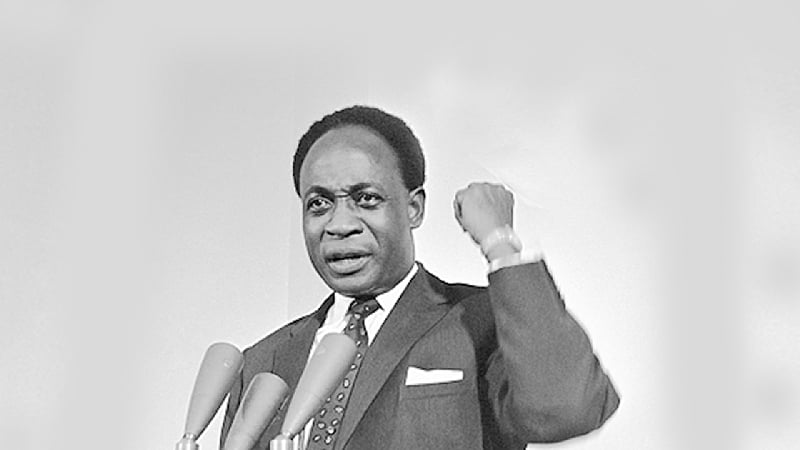Kwame Nkrumah, a towering figure in the African liberation movement, emerged from humble beginnings in Nkroful, a small village in the Gold Coast (present-day Ghana). Even as a child, Nkrumah exhibited an exceptional awareness of his surroundings and a profound connection to the African continent. An anecdote recounts a young Nkrumah, perched on his mother’s back while crossing a stream, urging her to stop because she had stepped on a fish—their dinner. This seemingly simple incident foreshadowed the visionary leadership and foresight that would define his life and his relentless pursuit of African independence and unity. Nkrumah’s early years instilled in him a deep-seated belief in Africa’s inherent greatness and a conviction that its fragmented state was a deliberate impediment to its progress.
Nkrumah’s formative years were deeply influenced by his parents. His mother, Elizabeth Nyanibah, a fishmonger and petty trader, instilled in him a strong sense of empathy and concern for the marginalized, which later manifested in his political appointments and educational initiatives aimed at empowering women. His father, Opanyin Kofi Nwiana Ngolomah, a goldsmith, imparted to him not only the intricacies of his craft but also an appreciation for artistry, meticulousness, and the pursuit of excellence. Goldsmithing, a craft deeply intertwined with Akan royalty and culture, exposed Nkrumah to the symbolic significance of ornaments and artifacts, imbuing him with a deep understanding of the connection between culture, heritage, and national identity. Observing his father’s dedication to his craft, Nkrumah learned the importance of precision, attention to detail, and the transformative power of creativity, qualities that would later shape his political strategies and nation-building efforts.
Beyond his family, Nkrumah’s intellectual development was shaped by several key mentors. George Fischer, a German Roman Catholic priest, provided early guidance in theology and universalism, while Dr. Kwegyir Aggrey, an influential educator and Pan-Africanist at Achimota School, where Nkrumah trained as a teacher, instilled in him a profound sense of Pan-African identity and the imperative for continental unity. Aggrey’s influence was particularly significant, shaping Nkrumah’s understanding of the historical and political forces that had divided Africa and fueling his commitment to forging a united and independent continent. These early influences nurtured Nkrumah’s leadership qualities and fostered his ability to envision a future beyond the immediate limitations of his environment.
Nkrumah’s political philosophy was deeply rooted in the belief that Africa’s fragmented state, a consequence of colonialism, was a deliberate strategy to weaken the continent and prevent it from realizing its full potential. He understood that a divided Africa was vulnerable to exploitation and manipulation by external forces. His Pan-Africanist vision was not merely an idealistic notion but a pragmatic response to the geopolitical realities of his time. He argued that only through unity could Africa effectively resist neocolonialism, protect its resources, and achieve genuine political and economic independence. He warned that a failure to unite would leave the continent susceptible to further exploitation and would necessitate a protracted and potentially devastating struggle for liberation in the future.
Drawing parallels with biblical teachings, Nkrumah likened the colonial powers to a demonic force that, once expelled, would inevitably seek to return and reassert its dominance. He believed that a unified Africa, fortified by a strong sense of collective identity and purpose, would be better equipped to repel such attempts at neocolonial domination. He saw the balkanization of Africa not just as a political division but as a psychological fragmentation, a deliberate attempt to erode African self-belief and undermine the continent’s capacity for collective action. His call for unity was therefore a call for the restoration of African dignity, self-determination, and historical agency.
Nkrumah’s legacy continues to resonate throughout Africa and beyond. His vision of a united and independent Africa remains a powerful aspiration for many. His birthday serves as a reminder of his profound contributions to the liberation movement and his unwavering belief in the potential of a united Africa. He challenged Africans to recognize their shared destiny and to work together to build a future free from external interference and exploitation. His life and work pose a fundamental question to all Africans: Are they ready to embrace the promise of a unified and prosperous continent, the “fish for dinner” that Nkrumah envisioned, or will they remain content to scavenge for crumbs on the floor of others? His call for unity and self-reliance remains as relevant today as it was during his lifetime, a testament to his enduring vision and his unwavering commitment to the liberation and advancement of the African people.














